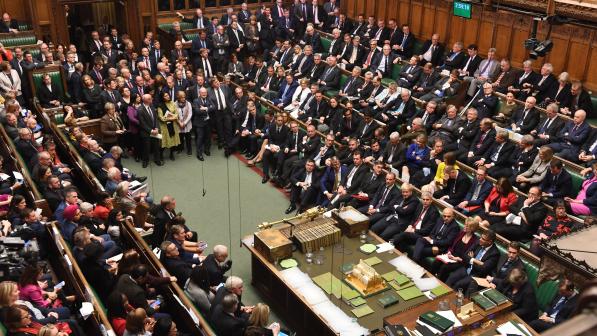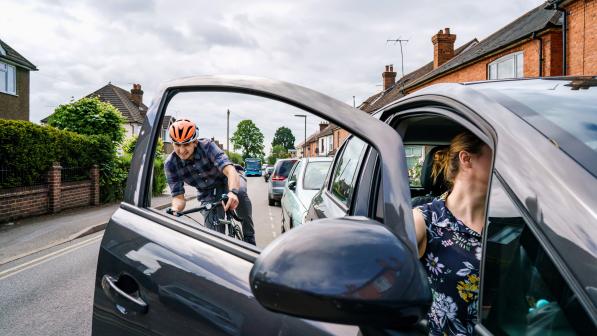Ben Bradshaw MP calls on Government to fix failing traffic laws

Whilst the Bill does introduce changes to the maximum sentence for causing death by dangerous driving and a new offence of causing injury by careless driving, Mr Bradshaw reminded Parliament that in 2014 the Government promised a full review of road traffic offences and penalties, but that has yet to happen, leaving serious flaws in our road traffic laws.
Two weeks ago, Cycling UK published a new report, Five Flaws: Failing Laws, identifying five flaws which the Bill could address to make our roads safer for everyone. Amendments to the Bill tabled by Mr Bradshaw (amendments NC20 and NC21) sought to address two which he argued were the most glaring.
Referring to the case of Cornish postman Ryan Saltern, Mr Bradshaw urged the Government to support his proposal for a maximum prison sentence of 14 years where a driver fails to stop and exchange details or report a collision to the police in cases where they knew, or ought reasonably to have known, that a serious or fatal injury had occurred or might have occurred. Currently, such ‘hit and run’ offences, carry a maximum sentence of six months, which many road safety organisations have argued doesn’t reflect the gravity of those offences where someone flees the scene leaving a road crash victim in urgent need of medical attention.
Write to your MP to support our campaign
Clarifying that between 2011 and 2020, 83,581 drivers avoided a supposedly automatic driving ban after accruing 12 or more penalty points on their licence, after successfully arguing that the loss of their licence would cause exceptional hardship, Mr Bradshaw reminded MPs of the consequences for victims and their families. Citing the tragic case of Lee Martin, he explained that when Christopher Gard hit and killed cyclist Lee Martin in 2015, it was the ninth time in six years that he had been caught using a mobile phone while driving. Gard had been convicted and fined six times and sent on two driver retraining courses, but instead of disqualifying him, magistrates accepted his plea that a ban would cause him exceptional hardship. He kept his licence, and Lee Martin was killed a few weeks later.

To address the misuse of the exceptional hardship plea, Mr Bradshaw sought support for his amendment which requires that a court should only regard hardship as “exceptional”, if it is significantly greater than the hardship that would arise for a large majority of other drivers if the same disqualification were imposed on them.
Whilst stressing that it is vital that the Government fulfils their seven-year promise of a full review of traffic offences, Mr Bradshaw concluded with the suggestion that these were two modest improvements to two of the most egregious areas, where most reasonable people agree that all too often, the punishment does not fit the crime.
Responding to the proposals, Minister for Justice Robert Buckland evaded any commitment of support, although he did indicate that his officials are working with the Department for Transport to “explore options…about how these offences will work in the wider context”, while also recognising “the particular context in which people seek to evade the law and evade responsibility”, finishing by accepting that “more work needs to be done to identify that class of driver who manipulates the system and evades responsibility in a way that clearly outrages the community and offends the wider public”.
As Ben Bradshaw highlighted, the issues of exceptional hardship and hit and run are examples of changes which can be quickly made to close legal loopholes, but they will not in themselves fix our failing road traffic laws: we still need the full review of road traffic offences first promised by Government in 2014.
The three questions they and many road safety organisations would ask him are: does this mean you are now going to have that wider review? If so when? In the meantime, why wouldn’t you support Ben Bradshaw’s modest amendments?
Duncan Dollimore, Cycling UK's head of campaigns
Commenting on the debate in Parliament, Duncan Dollimore, head of campaigns at Cycling UK, said:
“Last night, the Secretary of State for Justice, Robert Buckland QC assured Ben Bradshaw that ministerial colleagues at the Department for Transport were working with his officials at the Ministry of Justice to explore options about how road traffic offences ‘will work in the wider context’. Sadly, seven years after a previous Justice Secretary first promised a full review of road traffic offences and penalties, and years of pass the parcel on this between the justice and transport ministries, news of ongoing discussions will be scant comfort to the victims of road crime, or their families.
"The three questions they and many road safety organisations would ask him are: does this mean you are now going to have that wider review? If so when? In the meantime, why wouldn’t you support Ben Bradshaw’s modest amendments?”
Cycling UK will now be working with partners to continue building momentum and support for these changes and for a wider review, as the Bill passes through Parliament – but we need the Government to know that this matters to the public. To add voice in support, please use our draft letter to write to your MP today and ask them to raise these issues with the minister.




